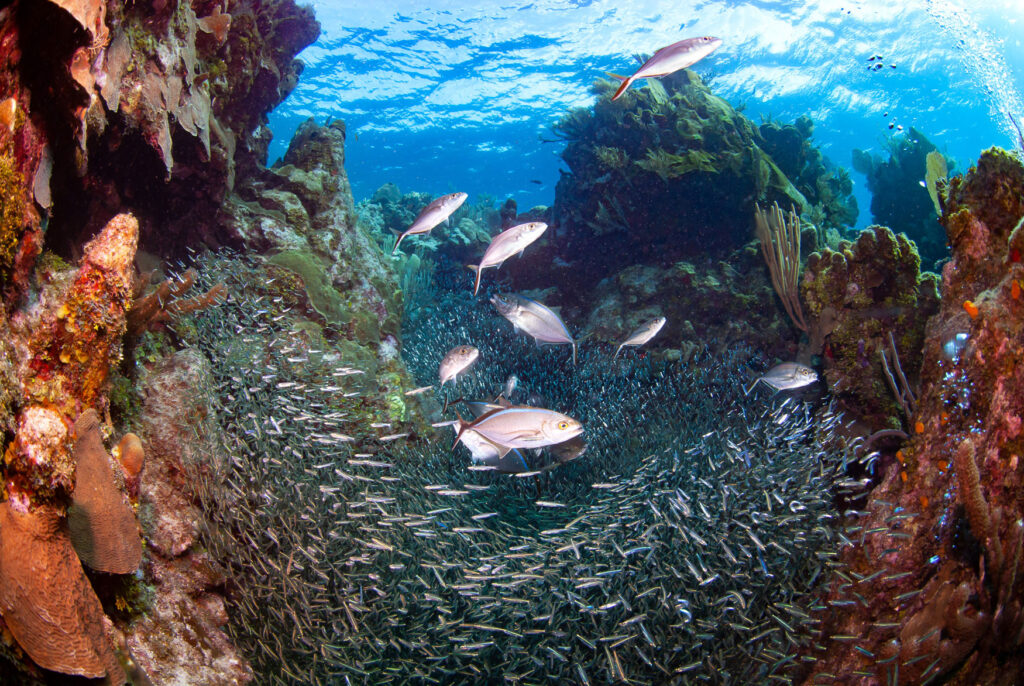A Major Win for Coral Reef Conservation in the Mesoamerican Reef Region
After more than three years of collaboration, persistence, and science-based advocacy, the Coral Reef Alliance (CORAL) and our partners from the Bay Islands Technical Committee, Healthy Reefs for Healthy People, Fundación Cayos Cochinos, and Fundación Cuero y Salado have reached an exciting milestone for marine conservation in Honduras.
Led by the General Fisheries Directorate (DIGEPESCA) and the Bay Islands Technical Committee, a ministerial decree has been issued to strengthen protections for key reef species across the country. Effective as of March, this nationwide fishing ban prohibits the harvest of herbivorous fish and key grouper species during their spawning season (November to April)—a period vital to reef reproduction and resilience. The decree also reinstates seasonal bans on spiny lobster and queen conch.
It’s a powerful step forward for reef resilience and a direct result of local and national partners working together to protect the future of the Mesoamerican Reef, one of the most biodiverse marine ecosystems in the world.
Why Species Protection Matters
Healthy coral reefs depend on the presence of key species to maintain ecological balance.
Groupers play a critical role as apex predators, helping regulate the populations of other reef organisms. Parrotfish and other herbivores are natural grazers that keep algae in check, allowing coral larvae to settle and grow. And species like lobster and conch are not only ecologically vital, but also economically significant for local communities.
When these species are overfished, the entire reef system begins to unravel.
By securing legal protections for these species, Honduras is taking a bold step to ensure the long-term sustainability of both its reefs and coastal livelihoods.
This decree reinforces the Government of Honduras’s commitment to the responsible, sustainable management of marine resources. By protecting key species during reproduction—like herbivorous fish, groupers, spiny lobster, and queen conch—it supports reef health and ensures the sustainability of economically and socially important coastal fisheries.
It also reflects DIGEPESCA’s ongoing commitment to science-based fisheries management, critical habitat conservation, and an ecosystem-based approach, as outlined in the Fisheries and Aquaculture Law.
The participatory process behind this measure—with active involvement from NGOs, DIGEPESCA, ICF, and technical allies like CORAL—shows institutional willingness to create technically sound solutions aligned with regional (OSPESCA) and global (SDG) commitments.
Kaina Alvarado MSc. DIGEPESCA Director
Supporting Our Strategic Vision
This policy milestone directly supports one of the pillars of CORAL’s new strategic plan: creating and supporting well-managed marine protected areas (MPAs). Legal regulations are only the first step—ongoing implementation, monitoring, and enforcement are critical to realizing the benefits of these protections.
Learn more about our vision here >
Policy Change for Global Reef Conservation
At CORAL, we believe lasting reef protection requires both local action and systemic change—the systems and structures that make conservation stick. That’s why policy work has become a central part of our conservation strategy.
Whether we’re securing national fishing bans, supporting climate-smart marine protected areas (MPA), or shaping sustainable fisheries policies, we’re working alongside governments and partners to translate cutting-edge science into durable law.

This decree in Honduras is a powerful example of how collaborative, science-led policy can protect ecosystems. And it’s not just a win for Honduras—it’s a scalable model we aim to replicate across all our CORAL Hubs, including Hawai’i and other global sites.
Read more about our expansion plans here >
By embedding policy advocacy into each hub—whether in the Bay Islands, Hawai‘i, or new emerging sites—we ensure reef conservation efforts are durable, enforceable, and aligned with both community and ecological needs.
What’s Next
Implementation and Shared Responsibility
Looking ahead, CORAL will continue to provide technical assistance to the organizations responsible for managing protected areas in Honduras, as well as national authorities.
Implementing this important decree is a major step for marine conservation, but it also presents shared challenges. Key issues include strengthening enforcement capacity in coastal and reef areas, improving interagency coordination, and promoting awareness and active participation among fishing communities.
While the national fisheries authority is firmly committed to enforcing seasonal closures, it currently faces operational and logistical limitations. However, efforts are underway to build DIGEPESCA’s institutional capacity and overcome these barriers.
Through technical cooperation with partners like CORAL and coordination with other state institutions, substantial progress is expected in the short term toward fully and sustainably implementing the measures set out in the Ministerial Agreement.
Kaina Alvarado MSc. DIGEPESCA Director
A Model for the Future
This milestone underscores what’s possible when governments, communities, and conservation organizations work together. With shared science, shared goals, and shared action, we can ensure coral reefs not only survive but thrive.
Our work in Honduras doesn’t stop here. We’ll continue advancing policies that protect biodiversity, support livelihoods, and build resilience for generations to come.



